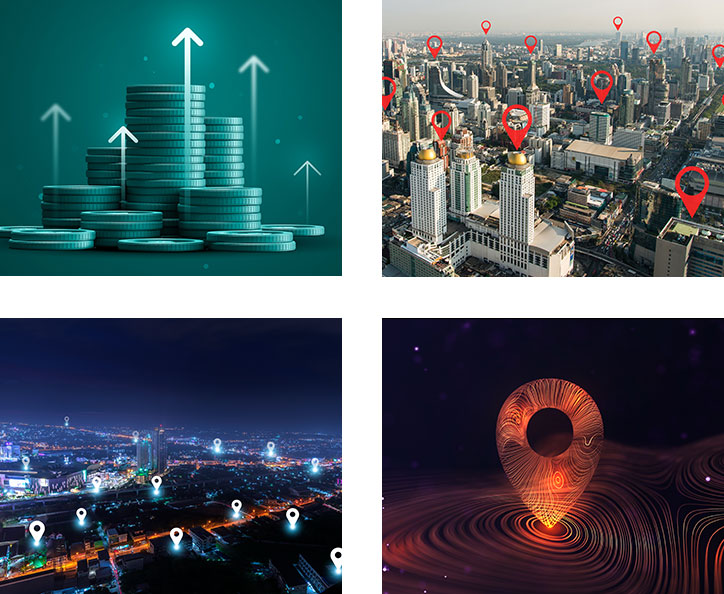Session Highlight
- The fusion of earth observation satellites and terrestrial systems is reshaping indoor positioning and real-time mapping in BFSI and retail sectors.
- AI, ML, and IoT advancements empower businesses to harness location data for enhanced customer experiences and operational efficiency.
- Integration of location analytics into BI platforms enables detailed customer analysis and targeted marketing strategies.
- Earth observation satellites provide high-resolution imagery, revolutionizing accurate mapping and spatial analysis for businesses.
- Leveraging space-based observations unlocks new opportunities and competitive advantages in dynamic markets.

Moderator
Denise McKenzie
Managing Partner
PLACE Trust
UK

Sanket Gupta
Group Product Manager
Google
USA
Topic
Geospatial Imaging and Analytics for Retail and Commerce

Kanti Kopalle
VP, Intuitive Operations and Automation
Cognizant
The Netherlands
Kanti Kopalle is Vice President and Market Leader for Location based services at Cognizant Technology Solutions, responsible for the practice strategy, investments, and ecosystem alliances. Kanti brings broad industry experience partnering with global technology platform companies, enterprise clients across industry segments and start-ups in the geospatial industry. In addition, Kanti is the P&L leader for Communications, Media and Technology industry segments, focused on Operations and Automation domains for Cognizant's global growth markets. Kanti has lived and worked across markets including Netherlands, US, India, Hong Kong and Singapore, and brings a global perspective to industry challenges and opportunities in the fast-evolving geospatial industry. Kanti holds an MBA from Indian Institute of Management (Mumbai) and BE in Computer Engineering, and currently lives in Amsterdam (Netherlands).
Topic
Maximizing Geointelligence ROI: Case for Business Operations

Mayank Singh
CDO & VP - Marketing, Digital Business & Tech
Domino's Indonesia
Indonesia
Mayank Singh serves as Chief Digital Officer & Vice President - Marketing & Technology at Domino's Pizza Indonesia. He is a visionary, highly strategic, and result-driven leader having 15 years of career experience in leading, managing, and scaling businesses in Food Retail, Media, Entertainment, e-Commerce, and Startups. As a passionate and entrepreneurial business leader, he leverages his expertise in in-depth marketing, product development & business building to facilitate all 3Cs of the digital domain (Content, Community & Commerce) with P&L responsibility for fast-paced start-ups. Some of his distinguished achievements include scaling up business and operations, building next-generation products, and delivering data analytics and strategic partnerships. Having a love for technology and a passion for entrepreneurship, he has led innovative and strategic projects and products ahead of the curve.
Topic
Location Intelligence Driving Growth

Kumar Pancholi
Business Development Team Lead- Commercial Markets
Esri
UK

Mykola Kozyr
Platform Product Lead
SatVu
Germany
Topic
Oil Facilities Monitoring with HighResolution Thermal Satellite Data
Session Highlight
- Leverage data-driven insights for targeted marketing and site selection to maximize customer engagement and satisfaction.
- Personalize messaging and offerings based on individual preferences and location-specific dynamics for enhanced relevance and impact.
- Seamlessly integrate online and offline channels to provide customers with a cohesive brand experience across multiple touchpoints.
- Optimize outreach strategies through geo-targeting to address local needs and preferences effectively, driving higher conversion rates.
- Foster long-term loyalty by delivering highly targeted and cohesive experiences that resonate with customers' evolving expectations.

Ajay K. Gupta
CISSP, MBA, Founder & CEO
HSR Health
USA
With a distinguished 20-year career in cybersecurity and information technology, Ajay Kumar Gupta is a visionary leader committed to transforming American healthcare. As the founder of HSR.health, he harnesses technology to innovate healthcare delivery, driving improved quality, lower costs, and health equity. Ajay's leadership steered HSR.health to pivot and support global COVID response, providing valuable insights into health risks' impact on broader markets. Chairing the Health Domain Working Group for the Open Geospatial Consortium and serving on influential healthcare task forces, boards, and committees, Ajay is a driving force for positive change, spearheading initiatives to address healthcare inefficiencies and shape the future of healthcare resilience.
Topic
Health Status and Consumer Behavior: A GIS Approach to Targeted Services

Walter Jongenotter
Associate Director, Commercial Data Strategy Lead
Coca-Cola European Partners
The Netherlands
Experienced FMCG enthusiast skilled in Business Strategy, Change Management, Digital Marketing and Sales. A strong business development leader passionate about growing a data mindset and adoption of data-driven solutions with significant business value.
Topic
GEN AI for mail creation

Elsa Pedro do Souto
Senior Manager, Data & Analytics
Mars
Denmark
Inherently curious and analytical, Elsa generates more effective ways to leverage data and analytics to provide answers to critical business questions and deliver sustainable value through improved decision making. With solid experience in FMCG, Energy Sector and Retail Banking, Elsa enjoys new challenges and successfully drives innovative solutions in Insights, Data & Analytics and Business Intelligence, by leveraging her knowledge of how organizations operate.
She is an active listener who enjoys building relationships and gathering information through different perspectives. Her leadership style is defined by empowerment and transparency.
Originally from Lisbon, she currently lives in Copenhagen with her husband, son, and two chihuahuas. As her legacy, Elsa hopes to contribute to drive more meaningful human connections and to making this a better world for pets everywhere.
Topic
Humanizing Retail

Garrett Synnott
Senior Director
Cognizant
Ireland
Garrett Synnott has over 25 years expertise across Supply Chain & Field operations with 8 Years managing Field Operations and Location based Services globally.
Topic
Location Base Services (LBS) - benefits & challenges
Session Highlight
- Financial institutions leverage location intelligence to guide green investments, aligning with sustainability goals and assessing ecological impact for responsible asset allocation.
- Retail businesses utilize location data to optimize supply chains, reduce carbon emissions, and foster eco-friendly operations through strategic store placement and logistics.
- Location analytics empower BFSI institutions to proactively identify and mitigate risks, enhancing asset protection and operational resilience.
- Spatial insights aid retailers in minimizing losses from theft, optimizing inventory management, and enhancing customer satisfaction through strategic store placement.
- Integration of location data enhances predictive accuracy in risk models, enabling timely intervention and proactive risk management strategies for both BFSI and retail sectors.
- Real-time spatial analytics enable agile decision-making, fostering competitiveness and adaptability in dynamic markets for BFSI and retail sectors.
- Combining location intelligence with sustainable finance and risk management strategies aligns business practices with geographical nuances, driving sustainable growth and profitability.

Stefan Wunderlich
Chief Product Officer, Risk Data & Services
Swiss Re
Switzerland
Topic
Managing Nature and Climate-based Risks

Kevin Bourne
Head of Markets
Vyzrd
UK
Kevin has more than 35 years' experience in financial markets across equity trading, sustainable finance & climate risk. He now focuses on how climate change & ESG processes will impact the cost of capital as well as the impairment to asset valuations that will be driven by the development of new regulatory & risk factors.
He is currently the Head of Markets at Vyzrd, an Australian based AI enabled analytics company that provides forward looking climate valuation solutions for corporates and financial institutions. He is also a Non-Executive Director for the Dutch ESG data company Sustainometrics.
Before joining the VYZRD team, Kevin was Managing Director and Head of S&P Sustainable One Investment Research. In this role, he was responsible for setting the firms Climate/ESG research agenda across markets and into investors.
Prior to S&P, Kevin was Managing Director and Head of Sustainable Finance at IHS Markit where he launched their groundbreaking, forward looking, Sovereign ESG data platform. This was the first in the industry to include multi variate climate scenarios in the quantitative assessment of short-term country risk. IHS Markit merged with S&P in early 2022.
Starting in 2011, he has also built a green transition data company, which modelled the changes in climate aligned industrial output for public companies. This resulted in him partnering with & subsequently joining FTSE Russell who acquired his business in 2018 having launched multiple indexes derived from his work. As part of this partnership, he was appointed Global Head of Sustainable Investment at FTSE Russell and a FTSE Exco member.
His journey into sustainable finance was preceded by 25 years in equity trading, latterly as Managing Director & Global Head of Electronic & Portfolio Trading at HSBC as well as time in electronic trading with Citigroup, Salomon Brothers & Fidelity Brokerage.
Topic
Sustainability Linked Location Based Risks

Phil Cottle
Founder and MD
ForestRe
UK
Phil Cottle, the Head of Forestry at ForestRe, the distinguished forest underwriting unit within Globe Underwriting Ltd. in the heart of London, is a seasoned expert with over 25 years of experience in assessing crop and forest risk. Renowned as the world's oldest forestry underwriter, he plays a pivotal role in de-risking investments into various forms of forestry, ranging from global institutions to community reforestation schemes. Phil, with a wealth of expertise in natural hazard impacts, excels in pricing risk, modeling worst-case scenarios, and designing innovative insurance products. A prominent figure in international reinsurance markets, he actively contributes to sustainable development through his comprehensive knowledge and impactful speaking engagements at forestry conferences worldwide. Phil holds an MSc in Agricultural Extension and Rural Development, along with a BSc in Agriculture and Tropical Crops from Reading University.
Topic
Utilising Geo Spatial Data - Risk Assessment & Pricing

Peter Coveliers
Senior Representative BeNeLux.
European Investment Fund
Luxembourg
Topic
Space and Integration of Sustainable Finance

